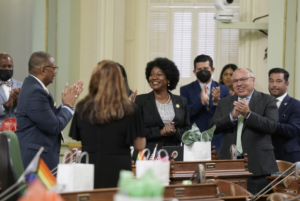A Field of Candidates Unlike Any Other
Originally published by Ariel Gans for Politico
This year’s field of candidates for state Senate and Assembly is historic in at least one way.
At least 24 Black women, including four incumbents, are running for the Legislature – more than ever before. Some are opposing each other in the March primary but as many as 19 could conceivably win seats in either the Assembly or Senate.
If that happens, there would be more Black women in the Legislature than at any time — only a couple years after their ranks dwindled to just two.
All but three of the candidates are Democrats so in one sense the field reflects Black women’s major role in the party. They were widely credited with helping to elect Joe Biden in 2020, with 93 percent voting for him over former President Donald Trump.
But it’s also a result of recruitment and mentorship efforts, says Assemblymember Tina McKinnor, who was elected in 2022.
“Women are now ready and equipped to run because we’ve invested in them,” said McKinnor, a Democrat from Inglewood. “And so now they’re really turning up and turning out in big numbers.”
For those keeping track at home, Yvonne Braithwaite Burke became the first Black woman in the Legislature when she was elected in 1966 to represent a Los Angeles district. She went on to serve in Congress and as a member of the UC Board of Regents, appointed by Gov. Jerry Brown, among other positions. Her daughter, Autumn Burke, served in the Assembly from 2014-2022.
The ranks of Black women in the Legislature over the years have included Rep. Barbara Lee, LA Mayor Karen Bass and Rep. Maxine Waters.
There are now five Black women in the Legislature, the most at any one time.
Democratic political groups and Black women leaders — eyeing the upcoming wave of open seats stemming from new term-limit turnover — have worked to recruit and support many of these candidates in this year’s races, said Susannah Delano of Close The Gap, an advocacy group that works to elect Democratic women.
“No matter how you slice it, there’s a decent chance that Black women’s numbers will double in the Legislature by December — and that’s just unprecedented transformation,” Delano said.
Tia Orr, the first Black woman to serve as executive director at the influential Service Employees International Union California — which has endorsed 11 of the Black women candidates — said she hopes this moment in California politics “will send ripple effects across the nation, where we see more Black women being elected, more folks getting behind them and lifting them up to be leaders in their communities.”
In the meantime, McKinnor predicts it will have an immediate effect in the Legislature, with a more concerted focus on family issues such as housing, health care and educational outcomes. “I think they’ll look at it in a way that maybe other folks wouldn’t,” she said.
